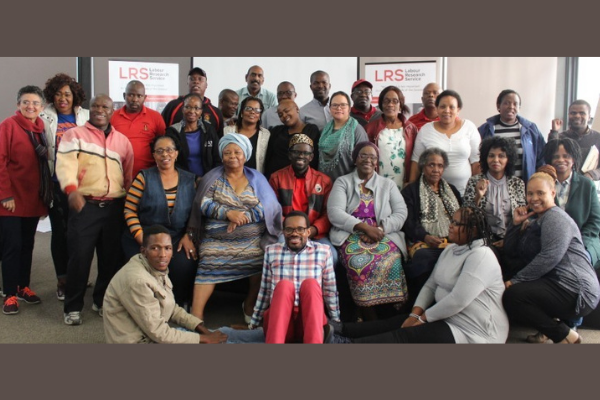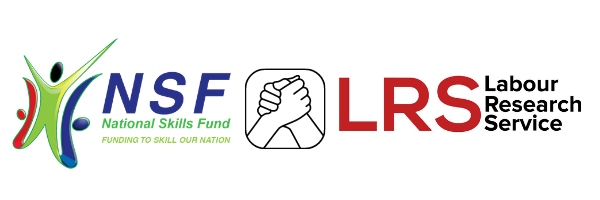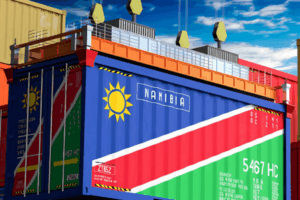LRS Peer Learning GroupWe envision an Inclusive Collective Bargaining Agreement (ICBA) that will be shaped by the needs of all workers taking into account the different needs, roles and identities of workers in the changing workplace.

Strengthening our collective bargaining agreements
The group of 29 worker representatives participated in LRS peer learning workshops covering several key themes, including mapping the priority issues for all workers in the represented sectors. The worker representatives identified 15 priority issues to include in their bargaining agendas – for both organised and unorganised workers – and the strategies for achieving the demands.
Who is a worker?
A worker is any person who works for another and who receives, or is entitled to receive, any payment for that work whether in money or in kind. This definition of worker appears in the National Minimum Wage Act. We like it because it covers all forms of employment and prevents the contractual circumvention of the minimum wage through disguised employment.
Identified priority demands and the supporting labour laws
Severance pay
Provident fund
A provident fund is set up to provide an income to a member upon retirement or to their dependants upon after death. The provident fund includes funeral benefits that cover the main member (employee) and their families. Many unions have managed to negotiate for provident fund provision for their members.
Transport allowance
A travel allowance is a payment made to an employee to cover expenses when he or she travels for work. This money might be used to cover things such as accommodation, food, drink and incidentals.
Family responsibility/compassionate leave
Housing allowance
Housing allowance is a very important element of an employee’s working life, particularly now when the rates of house rents have appreciably gone up.
Occupational health and safety
The purpose of the Occupational Health & Safety Act is to provide for the health and safety of persons at work and for the health and safety of persons in connection with the use of plant and machinery, and the protection of persons other than persons at work against hazards to health and safety arising out of or in connection with the activities of persons at work.
READ: Understanding Occupational Health and Safety guidelines and directions during the Covid-19 pandemic.
Skills development and training
Training and development ultimately enhance a worker’s career prospects. Learnerships provide an opportunity for further learning and obtaining a recognised qualification that can be transferred from one workplace to another. Workers or students on learnerships can earn an income while enhancing their skills in the immediate working environment.
Medical aid
Medical aid provides a worker with benefits, including being able to afford unexpected medical costs.
Night shift allowances
In terms of Section 17 of the BCEA, any work performed after 18:00 and before 06:00 the following day is considered night work. An agreement is required between the employer and employee in this regard. An agreement between an employer and an employee to generally work shifts would not meet the requirement of the BCEA unless such an agreement specifically makes mention of working night shifts and the employee is aware of such a requirement. The employers must sure that safe transport is available between the employee’s place of residence and the workplace at the beginning and ending of the employee shift.
Maternity leave
Pregnant women are entitled to four months of maternity leave which starts one month before their due date (Section 25 of the BCEA). Mothers who are pregnant or nursing may not do work which is unsafe for their child. Employers are not required to pay workers on maternity leave. However, some companies may offer maternity benefit packages. A worker can claim maternity benefits from the Unemployment Insurance Fund (UIF).
Child care facilities/ daycare centres
A child care facility is any building or premises or part thereof which is maintained and used, whether for profit or otherwise, to care for, look after or temporary accommodate two or more children of different parents or guardians apart from their parents or guardians, for a full day or part of a day or night. Child care facilities include creches, nursery schools; daycare premises, playgroup premises and after school centre.
Same benefits and conditions for ‘casual’ workers as full-time workers
Department of Employment and Labour proposed an amendment to the BCEA to address labour broking. The department wants employers to contribute equal or similar benefits for fixed-term contract and permanent workers. Sectoral determinations may prohibit or regulate the placement of employees by temporary employment services, sub-contracting and contract work. The Minister may publish sectoral determinations covering employers and employees who are not covered by other determinations.
Shorter working hours
Section 9 the BCEA stipulates that an employer may not require or permit an employee to work more than 45 hours in any week.
A written contract of employment
Every worker must have a written contract to protect against any breach of terms. According to BCEA section 29 (1), a written contract of employment should be provided to the employee by the first day of reporting to work. A good employment contract spells out the rights and obligations of each party and provides job security for the worker.
Wages - Minimum entry-level of R5000 p/m
Decent wages are a big focus of trade union collective bargaining. The International Labour Organisation defines wages as ‘remuneration or earnings, however designated or calculated, payable in virtue of a written or unwritten contract of employment by an employer to an employed person for work done or to be done or for services rendered or to be rendered. Wages are fixed by mutual agreement between a worker and an employer, or by labour laws, for example, the national minimum wage.
- Organised workers are much more likely to negotiate more leaves days than those stipulated in the BCEA.
- Organised workers tend to earn more wages than those who are unorganised.
- Organised workers are more likely to have job security, compared to unorganised workers who are more vulnerable to (unfair) dismissals.
- Organised workplaces experience fewer accidents because there’s oversight by elected safety representatives.
- Organised workers have managed to reduce the working hours from 45 to 40 hour a week through negotiations with employers.
- Organised workers in a workplace belong to a collective and get supported by the trade union.
Represented sectors and organisations
- Contract Cleaning: members of South African Transport and Allied Workers Union (SATAWU)
- Private Sector security: members of South African Transport and Allied Workers Union (SATAWU)
- Domestic Work: members of United Domestic Workers of South Africa (UDWOSA and South African Domestic Service and Allied Workers Union (SADSAWU)
- Health Care Work: members of Health & Other Services Personnel Trade Union of South Africa (HOSPERSA) and care workers from Ward Based Health Outreach Teams (WBHOTS)
- Education: members of the South African Democratic Teachers Union (SADTU)
- Petrol Attendants: members of the National Union of Metalworkers of South Africa (NUMSA)
- Retail and Hospitality: members of South African Commercial and Catering Workers Union (SACCAWU)
- Waste picking and municipal work: members of the African Reclaimers Organisation (ARO) and South African Municipal Workers Union (SAMWU)
- Migrant Workers: members of the Migrant Workers Union of South Africa (MIWUSA)
- Informal Trading: members of the Johannesburg Informal Traders Platform (JITP)
- Creating a model inclusive CBA | LRS/NSF Peer Learning workshop (1)
- Supporting collective bargaining for workers in precarious forms of employment | LRS/NSF Peer Learning (2)








